Racing bicycles on the wall, lap dogs dashing to and fro between the open glass boxes and a panoramic view over Tel Aviv’s main traffic artery: Rothschild Boulevard. To some it is a promenade, to others a launch pad for innovative technologies.
The most start-up friendly region in the world
The hip, stylish branch of the co-working-hub Mindspace is one of the scene’s well-connected incubators. While people party in the bars and clubs around the Boulevard at night as if there were no tomorrow, here they are already working on the day after tomorrow. The metropolitan area of Tel Aviv is second only to Silicon Valley as the most start-up friendly region in the world. This is no accident. Israel may not have any noteworthy raw materials, and also has to cope with an unresolved political conflict that isolates the country in the region.
But it does have immigrants with a wide variety of talents that are concentrated in the melting pot of this small country. After the endeavours in the nation’s early years to “make the desert bloom” with these human seeds, Israel’s pioneering spirit is now focused on the high-tech sector. As a result of the government’s generous support for new businesses, investors have the freedom to finance ideas that may seem crazy at first. It’s no wonder, then, that a number of multinational companies have relocated their development centres to Israel.
New Porsche Innovation Office
Porsche has also been part of this eco-system since February 2017. A figure in the double-digit millions that has been invested in the two venture capital funds Grove and Magma is only the beginning. Porsche’s new Innovation Office is a tiny honeycomb in the hive, located right in the thick of the action.
Lutz Meschke looks out of the third-floor window, down on a villa with a palm garden, built in 1924. Today it’s home to “lone soldiers”, young soldiers without family in the country. Directly behind it, a blue-mirrored office tower rises up into the cloudless sky. Next to it is a condemned building with graffiti flaking off it. Military, business and subculture – there couldn’t be a better snapshot of Tel Aviv’s soul.
“This city is extreme”
Meschke: “This city is extreme. It pulsates massively with energy, it’s extremely young. The people here want to savour every minute of their lives – that alone is already a contrast to Western Europe. This mentality naturally also nourishes the start-up scene. Wanting to experience a lot means you must also achieve a lot quickly.”
Dov Moran is someone who knows both of those phenomena extremely well. He invented the USB stick and is manager of the venture capital fund Grove. The previous evening the 62-year-old sat on a green wing chair next to the new business partners from Porsche in the eccentric restaurant Nanuchka – and angled for vegan home cooking on shared platters with a fork like all the others. Beetroot carpaccio, pasties with mushroom filling, Georgian pastries. The music is loud, the waitresses sport tattoos. Moran, who is not only a billionaire but also a vegetarian, smiles contentedly. He photographs a napkin with his smartphone, which has a line written on it: “Imagine who you can be.”
The story behind the Nanuchka is one of the fairy tales you can find in this city. For years, the business was crowded because the owner did what she could do best: hearty Georgian cuisine. Her recipe: lots of meat plus lots of alcohol equals wild evenings. Then she became vegan and converted her beloved restaurant, despite all advice to the contrary. Today Tel Aviv is considered the most vegan city in the world – and the Nanuchka is its charming pioneer. The success has been sustained, and, if anything, has grown. An apt equation for the transformation that Porsche is facing.
Solutions for digital mobility
How can the traditional sports-car manufacturer set the tone without losing its identity when the future will involve solutions for digital mobility – how can the myth and decades of experience be beneficial in this context?
Meschke: “It was a giant leap to even wrap our heads around the topic two years ago. That is how far away it was for all of us. We’ve managed to do it well, but now we have to find the right speed for the implementation. It’s not only about purchasing additional technology and expertise, collaborating with start-ups or with venture capital funds. The actual question is how we convey this new mindset into the core of the company.”
A lot has happened since Porsche Digital GmbH was founded in 2016: a digital lab has been set up, Porsche has put out more feelers with additional satellites, first in Silicon Valley and now in Tel Aviv.
Also conspicuous here is the straight talking that goes on. Initially, the Stuttgart team were told that, although they doubtlessly produced great cars, the Israelis generally didn’t give the industry many more years, at least not in its conventional form.
Meschke: “I’m convinced that vehicle ownership will not be the all-important issue in the megacities of the future. But mobility on demand will be. And who’s to say that people who use a service like Uber wouldn’t like to choose between premium and economy class? Maybe everything will also all take place in the air someday, with drones. However, that will also be a market that we have to share. Our legendary cars may bring us somewhat further than the high-volume manufacturers. But then most of the money has to come from somewhere else.”
Future scenarios
Daft theories and future scenarios are passed around the table like the plates containing a colourful mélange of tradition and avantgarde. While Moran’s partner imagines the future Porsche brand as an exclusive club, complete with concierge service and its own credit card, Moran is already in the process of imagining how the self-cleaning vehicle could look. Completely in keeping with his motto: no idea is too stupid.
Meschke: “Completely out of the box. Visualisations like that are exactly what we need. Last year I noticed that we should be significantly more candid with regard to Porsche’s corporate purpose. Our company culture is characterised by engineering. We are very good at continuing to further optimise things. But we will only be able to do that for a few more years. Then there will have to be completely new solutions, and to do that we have to become more receptive now: not only to the direction of the start-up scene, but also to the direction of other industries. Everything is growing closer and closer together. In addition, we should learn to take the customer’s point of view into account even more or we risk developing products that don’t satisfy the market because we are too much in love with our own technology.”
Electrification, digitalisation, connectivity
Moran nods, though he himself comes from the technology side of things. Semiconductors, chips, hardware – those are his world. That’s why his venture capital fund Grove keeps an eye out for the “complicated stuff”. For example, he advised the start-up Mobileye, whose camera-based security system is installed in many vehicles today – and makes self-driving cars more and more likely.
Meschke: “That is one of our biggest challenges. Even if you start from the premise that our sports car will be one of the last cars with a steering wheel. Our world will completely change as a result of autonomous driving. Electrification, digitalisation, connectivity – those things can all be dealt with, we can think up business models to go along with that, but to do so we first have to find our niche.”
Still, the topic of motorsport leaves room for numerous possibilities. For example, one could use the autopilot as a teacher, let a professional like Porsche’s brand ambassador Mark Webber show the perfect line virtually, before taking over the wheel yourself. The worlds will not become entirely unconnected; Meschke believes that a longing for the analogous will follow in the wake of the digital wave. The challenge is to combine the two intelligently.
Meschke: “Unlike many of the new players in the market, we bring a strong tradition with us. We can’t just throw what we have built up through decades overboard. We don’t want to invent mobility without our cars.”
Change as the only constant
Moran tells us how his laptop crashed just before a presentation in 1988. That was the birth of the USB stick, the mass memory storage unit for the pocket. It was simply that no one had had the idea before then to use the available interface for a data carrier.
Moran: “You are on the right track. But one day you will let go of history. Change was the only constant in my company. That’s how Israel became a start-up nation: those who are too comfortable, who don’t have to fight, are not productive.”
Kombina state
Moran offers to help select people and cooperation partners locally. It’s not a platitude to say that everyone knows everyone in this small country. The Israelis are extremely proud of their “kombina state”, in which everything is organised via the personal network: quickly and efficiently. It already becomes established during people’s military service. The conflict with the neighbouring countries is omnipresent – and the army is constantly in the process of upgrading its equipment and developing its defence technologies further. Those who leave military service bring their knowledge into the economy.
Moran: “Where did you serve? That’s our first question when we meet someone for the first time. And it says a lot. A pilot has an overall view, but little feeling for detail. All the very smart guys that do cybersecurity now all come from the 8200, which is the elite unit of the secret service.”
Analogous life intersects with the high-tech city
The next morning as Lutz Meschke sits in front of one of the shaded coffee kiosks on Rothschild Boulevard, a place where analogous life intersects with the high-tech city, he seems somewhat energized. Spinning off-beat theories with the Israelis at dinner, the colourful scene on the rooftop terrace bar Speakeasy – this bubble of mirth in the insanity of the Near East, hedonistic, but also spirited, stimulates him to think about the cultural differences, not only between Germany and Israel but particularly in his own company.
Meschke: “In Germany the prevailing belief is that we are a very successful industry on which an incredibly large number of jobs depend, and that we can’t make any disruptive decisions. It’s all about being measured, considered. But in a disruptive world you don’t have time to do things in a measured way. You can’t check everything down to the smallest detail in advance. We must learn from the start-up culture that, out of ten ideas, perhaps nine of them will die. The name already says it: risk capital.”
Right now on the Boulevard, a young man with plenty of chutzpah is on his hoverboard, zigzagging his way between parents on e-bikes rushing to bring their children to the kindergarten. Casual strolling here only happens on the Sabbath. The cost of living is high in Tel Aviv, the work days long.
“The people here are always on their toes”
Meschke: “The Israelis demand a very different tempo from us. The people here are always on their toes, they want to get cracking. In February we said: Yes, the funds are of interest to us. By our standards we reacted quite quickly, made the final decision in four weeks. But I noticed the Israelis were getting restive – that’s too long for them. And this constant demand on us is a good thing.”
Meschke has the role of mediator based on his function as Member of the Executive Board responsible for IT – he has to mediate between the mother ship and the digital satellites, and also between two frequently opposing concepts of work culture.
Bringing two cultures together
Meschke: “It may be trendy right now to put on trainers with a suit, but in reality everyone just wants to attend to the core business and build cars. That’s why the young offshoots should be permitted to develop independently for a bit. But then we have to bring the two cultures together quickly. It’s not enough to toss something over the fence to this new, eccentric world now and then. On the other hand, our engineers won’t accept implementing only ideas that someone on the outside developed – and rightly so.”
Then there’s another intercultural difference: at a start-up people sometimes work 20 hours straight and don’t want to be hampered by rules.
Digital satellites are sources of inspiration
Meschke: “We have to inspire the people, and take away any anxieties. Anxiety about the world changing and your job disappearing as a result. We have to give them a taste of a world in which machines take over the mindless work and allow the humans to be creative and analytical. However, to do that, it is of course necessary to take them on the journey with us.”
The digital satellites are not only laboratory kits for new technologies, but also sources of inspiration to employees, who can sample start-up culture on site and get hands-on experience in cooperations. The expansion of their digital expertise is intended to make all employees transformation drivers. Responsibilities will therefore not only be limited to one area, as was the case up until now.
Meschke: “This new structure works quite well already to some extent. It also means that unlike in the past, every product, every process is not tested down to the last detail before beginning with implementation. By then the technology would be outdated, or the process approaches no longer in vogue. Instead we divide every idea into small steps and go to the initial implementation phase in a relatively short time. In doing so you learn the next development step straight away and in a short amount of time have a product ready to pilot. Perhaps only internally at first, but maybe it is already so good that you can get feedback from customers. Then you go into the next round. That way we can involve the customers in a timely manner.”
But not only the customers want to be taken seriously. Young engineers today no longer come straight from classic, lecture-hall environments at university, but instead are learning there to work with start-ups and to network there.
Looking for an exciting, flexible work environment
Meschke: “A Porsche employee never used to think about ever leaving the company. Nowadays young people may think our products are brilliant, but their primary interest is to look for an exciting, flexible work environment. If you can’t offer them that as an industrial company, then you are not interesting to them.”
Meschke hopes to get rid of the silo mentality once and for all in favour of the dual opening approach – both internally and towards the outside.
Meschke: “This is quite pronounced in our company: we are especially proud of what comes from our own department. But we stand in our own way by doing that.”
Typically German?
Meschke: “Of course, we feel comfortable with what we know, what we have always been successful with. That’s human, to react with caution at first. That’s why we are going to the people now and saying: Listen, there is a goal that you are now working towards in a team, defining the procedures jointly. You have the responsibility, don’t wait for someone above you to tell you what to do! It’s like with sport, then you can celebrate the successes as a team too.”
430-million-dollar deal
Apropos celebrating. Right now the scene is buzzing with the news of the 430-million-dollar deal in which German supplier Continental bought one of the start-ups in the Magma portfolio, the second venture capital fund that Porsche just invested in.
As is to be expected, the mood at Magma is electric. The fund is located in the same glass tower as Facebook, directly on Rothschild Boulevard. Yet there is another reason. Manager Yahal Zilka is leaning over his laptop: Google subsidiary Waymo just announced via video that its first fully autonomous fleet is on the road in Phoenix’s city traffic. What was science fiction just last night has suddenly become reality. The clocks seem to be ticking even louder and faster now.
Start-up Argus Cyber Security
But first it’s time to get back to the start-up Argus Cyber Security, which has just been sold. Yesterday evening Dov Moran told us that back then he had recommended to the founder to concentrate on the automobile industry after spending eight years in the secret service’s elite unit. Just three years later, the 31-year-old’s company is considered the world leader in protecting cars from hacker attacks.
The feeling that events are snowballing fades during the drive to north Tel Aviv. The never-ending traffic jam is to blame. On the other hand, the reason the successful navigation app Waze – also a Magma protégé – was created becomes clear.
Attacks from cyberspace
A young Argus employee is waiting at a quiet car park; she lets Meschke get behind the wheel. A laptop is balanced on her lap. She plays the role of hacker while asking Meschke to drive laps around the car park. She types commands into the car’s “central nervous system”, beginning with relatively harmless actions, such as activating the windscreen wiper or indicators. Then the speedometer suddenly goes crazy – and finally, a horrible gurgling sound comes from the car’s bowels – the brakes are blocked.
The start-up is currently trawling the industry with such demonstrations, showing that no modern vehicle today is safe from attacks from cyberspace. The opposite is true, says founder Ofer Ben-Noon. With the growing connectivity it is even getting easier to hack a car through its various interfaces than a smartphone.
Monitoring cars in real time
Argus offers its customers a system that allows cars to be monitored in real time and detect, repel and analyse attacks from hackers all at the same time. That’s important because cyberattacks are constantly evolving.
Meschke is expecting the company’s own hackers in Germany soon. Opening up to the outside also means accepting criticism – and even if it means that your own product is literally “hacked to pieces”.
Meschke: “I’m learning an awful lot here. I’m no engineer, but it is also important education for me. Nowadays we as an IT department are well established as a component of the product. That’s also another argument for interdepartmental work in the company. You can’t separate electronics and IT anymore these days.”
The Argus technology will soon be found in many vehicles. To Meschke, it is a sign of how important it is to be locally present if Porsche wants to secure its access to relevant technologies and talents.
600 companies in cyber-security alone
Meschke: “There are 600 companies in cybersecurity alone here. How are we supposed to filter them from a distance? In Tel Aviv the main thing for us is to ask: how does our product have to look in future in regard to digitalisation, connectivity and electrification and which security features do we need? They don’t need big investments here, they need validation and coaching – and we can provide that.”
There’s still time for a quick detour to the sea on the way to the airport. It’s too cool for swimming, but the kitesurfers are dancing across the waves with their colourful kites. Time for a summary.
“We tease the most performance out of it“
Meschke: “It hasn’t been long at all since we ourselves were a relatively small company. We’ve learned to achieve a great deal with few resources; to be creative with small budgets. Therefore, the start-up culture should not actually be particularly foreign to us. Our motto has always been: not necessarily the most horsepower, but we tease the most performance out of it. That is our strength. Now the important thing is to convey to our people: Yes, you are great, you have achieved a lot for us, we need you – please take that sentiment into the future with you!”
Info
Lutz Meschke, who has a degree in Business Administration, came to Porsche from Hugo Boss in 2001. He has been a Member of the Executive Board, with responsibility for Finance and IT, since 2009, and was named Deputy Chairman in 2015.
Agnes Fazekas is a freelance journalist who has lived in Tel Aviv since 2014. She likes to write about everything that moves people, and the movement people bring about. Born in Munich in 1981, she studied Ethnology, Intercultural Communication and Modern German Literature there. She subsequently attended the Zeitenspiegel-Reportageschule, a German journalism school. Her book reporting on the West Bank was published in 2015.
Text first published in the Porsche Annual and Sustainability Report 2017.
Text: Agnes Fazekas // Photos: Jonas Opperskalski

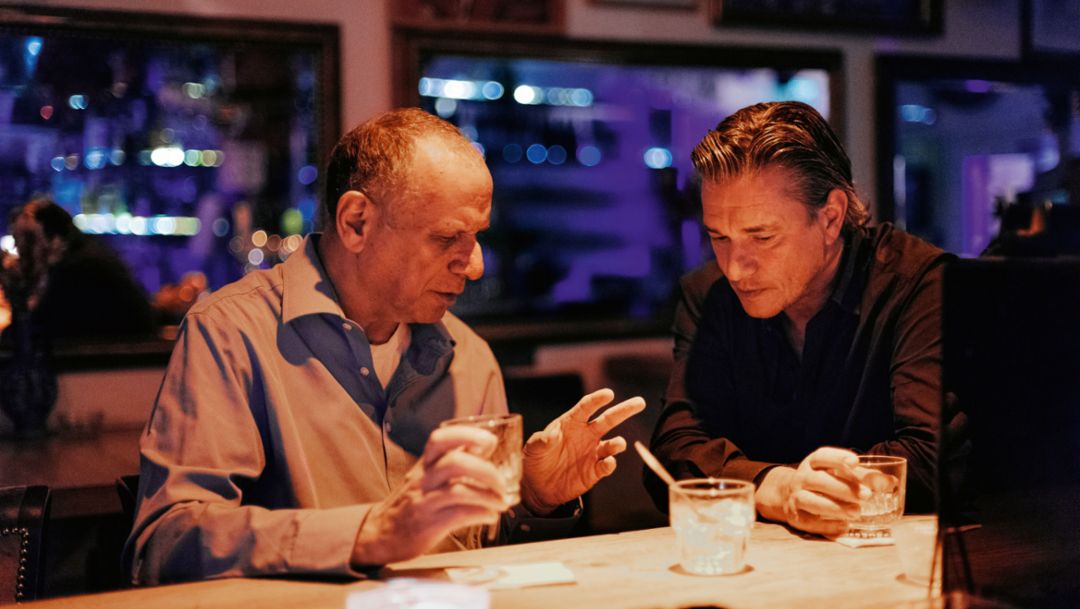
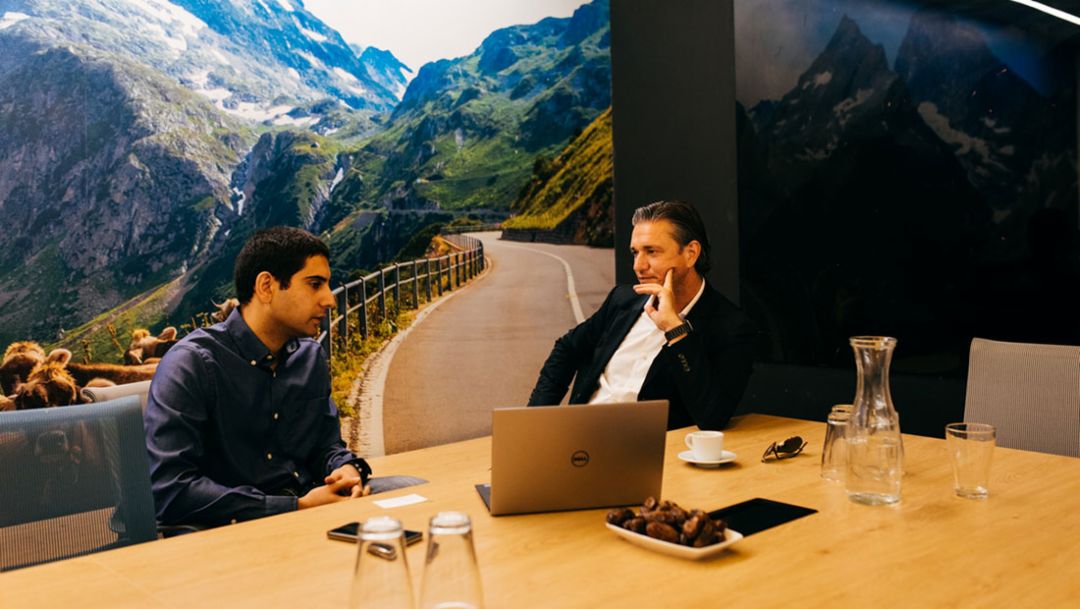
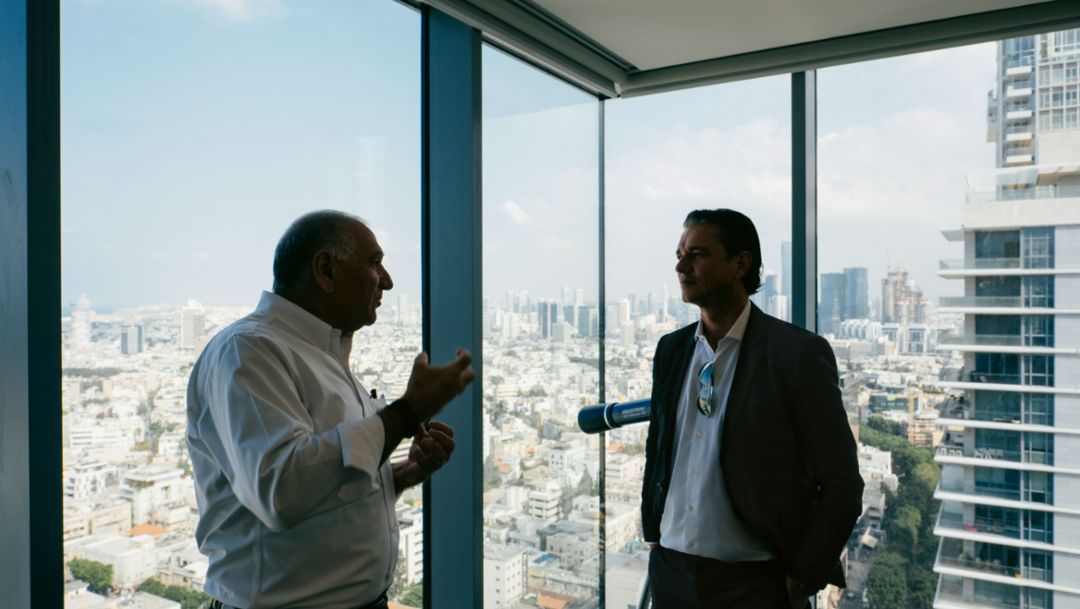
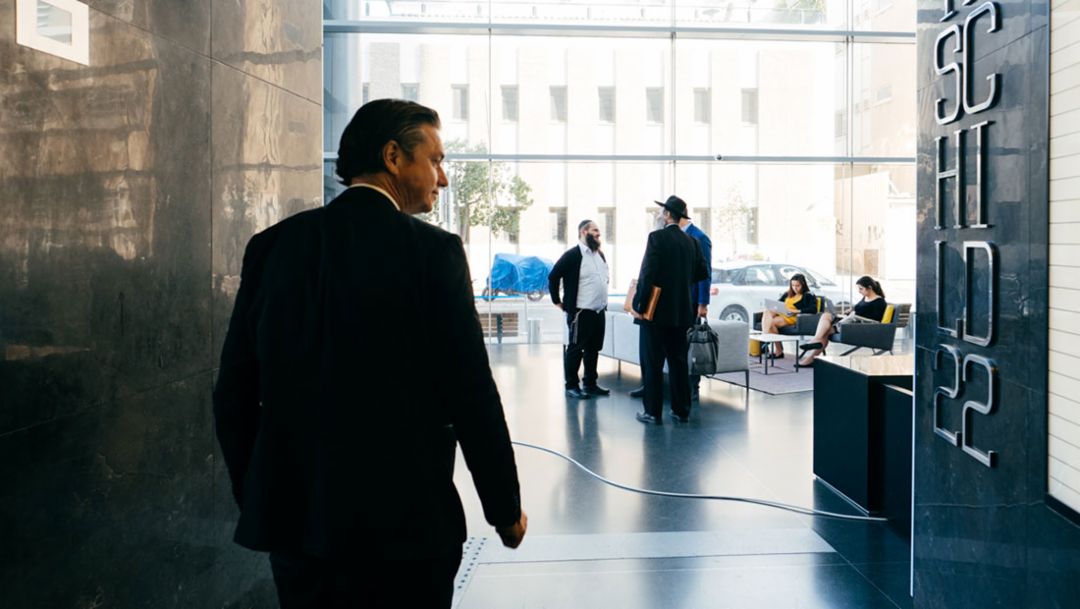
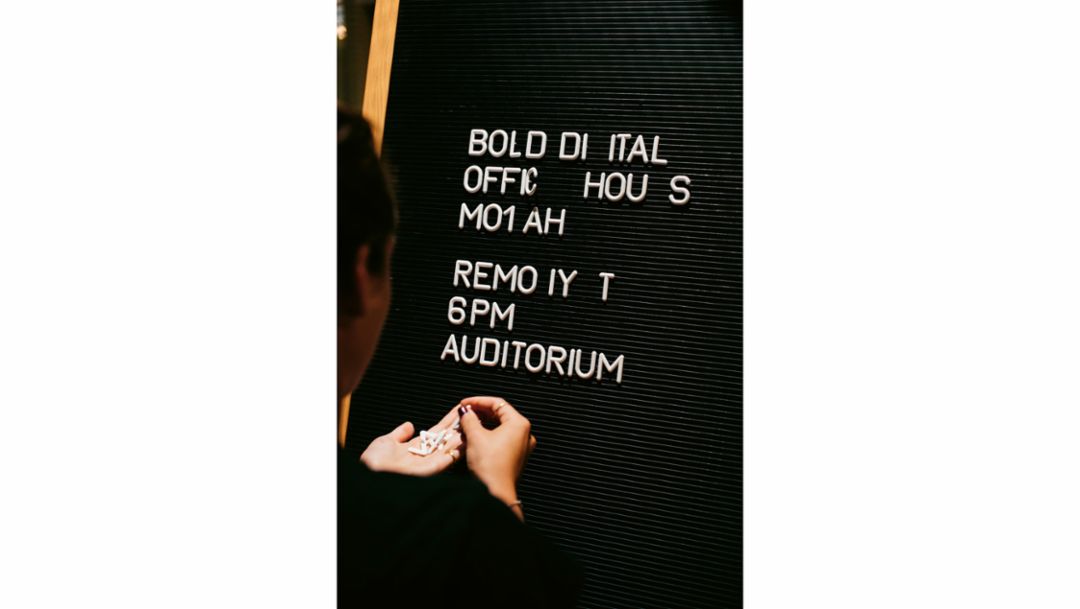
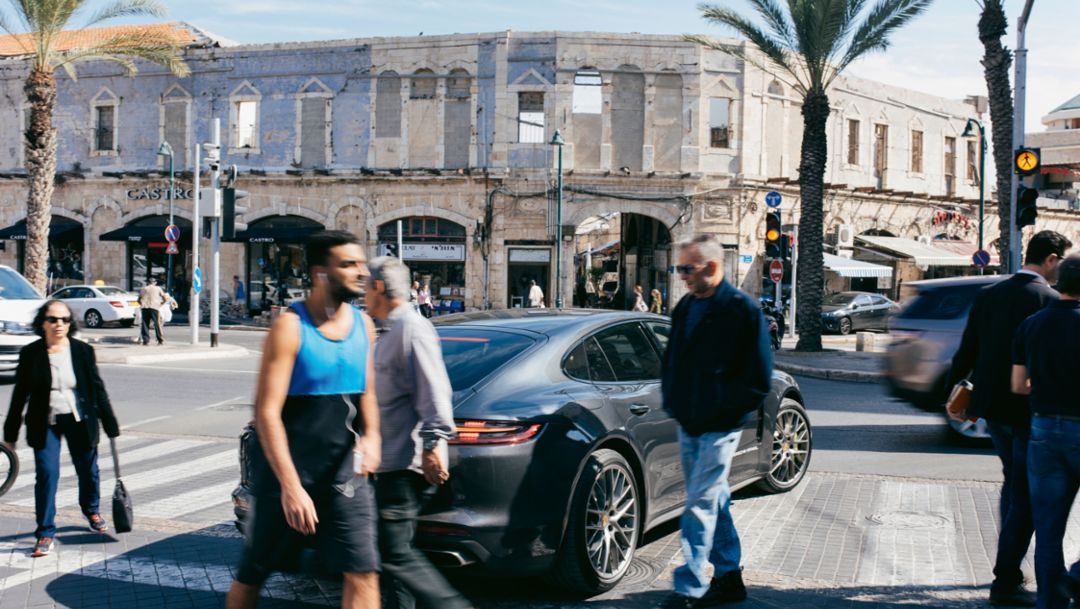
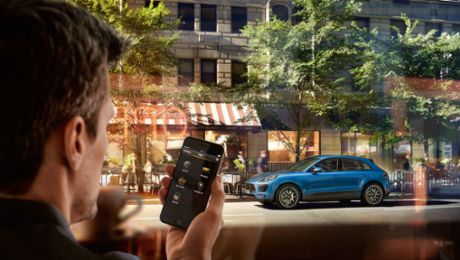
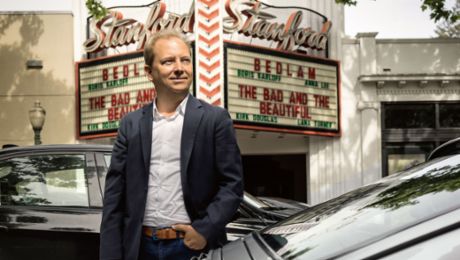
/b-S19_1087_fine.jpg/jcr:content/b-S19_1087_fine.jpg)